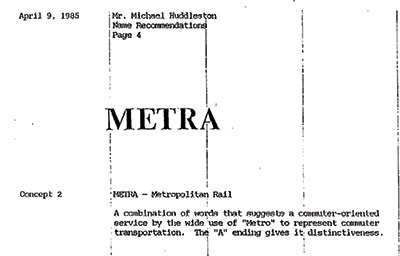What’s in a name?
To a group of leaders from the RTA’s Commuter Rail Service Board who gathered in April 1985, the identity of their fledgling agency rested in a name.
Holding its first meeting less than a year earlier, the board was operating three commuter lines directly and seven others through purchase-of-service agreements with various railroads. The agency aimed to maintain the region’s commuter rail service as the freight railroads that had previously operated the system fell into financial peril.
Board leaders wanted a service mark that would bring the complicated patchwork of rail lines under one umbrella.
And they wanted something a little catchier than the Commuter Rail Service Board.
By that point, the list of potential names had been narrowed down to 13. A set of criteria had been established to pare down the list even further to four recommendations: How appropriate was the name for commuters? What about rail transportation? Was it unique? Was it memorable? Did the name sound good?
With those questions in mind, board members considered the following candidates:
The following names and accompanying descriptions have been copied verbatim from an April 9, 1985 memo.
CORD (Commuter Rail Division) – A very direct approach. The entire name describes the organization while the word “CORD” describes the rail network.
METRA (Metropolitan Rail) – A combination of words that suggests a commuter-oriented service by the wide use of “Metro” to represent commuter transportation. The “a” ending gives it distinctiveness.
CORTA (Commuter Rail Division of the RTA) – By incorporating “RTA” in the name, the relationship between the two organizations is suggested.
TRAC (Total Rail Access) – The word “TRAC” quickly identifies this as a rail service. The entire name states the benefit to the user.

In the end, as we now know, the board chose to brand the agency Metra. While logos, tag lines and even operations have changed in the past three decades, the name Metra has been synonymous with commuter rail in the Chicago region.
Maybe the distinctive “a” edged out the competitors. Or perhaps the similarity to the transit-evoking “metro” made Metra the clear choice.
What do you think? Did Metra’s first leaders pick the best name?
Share your thoughts with us on our Facebook post here.